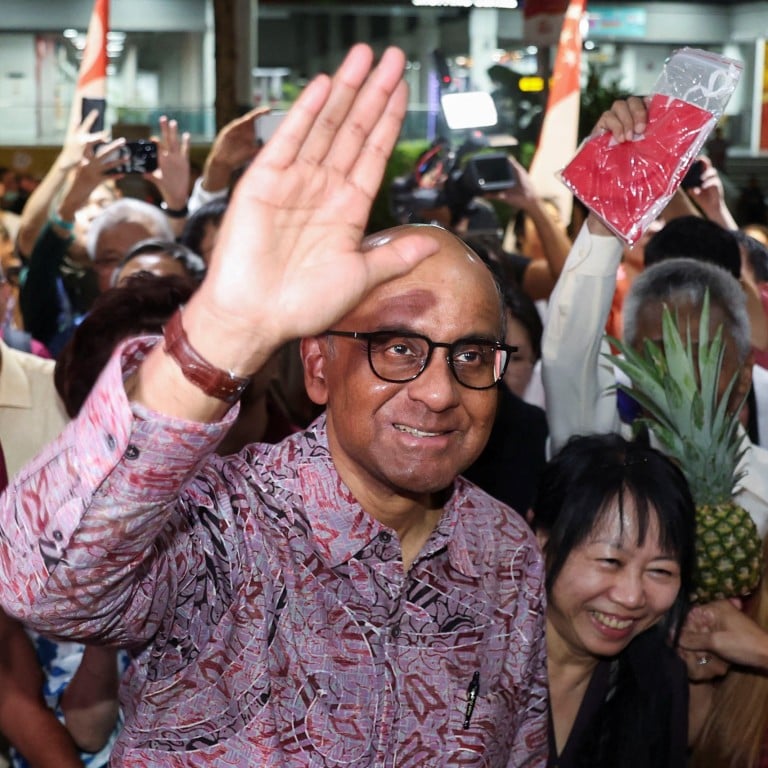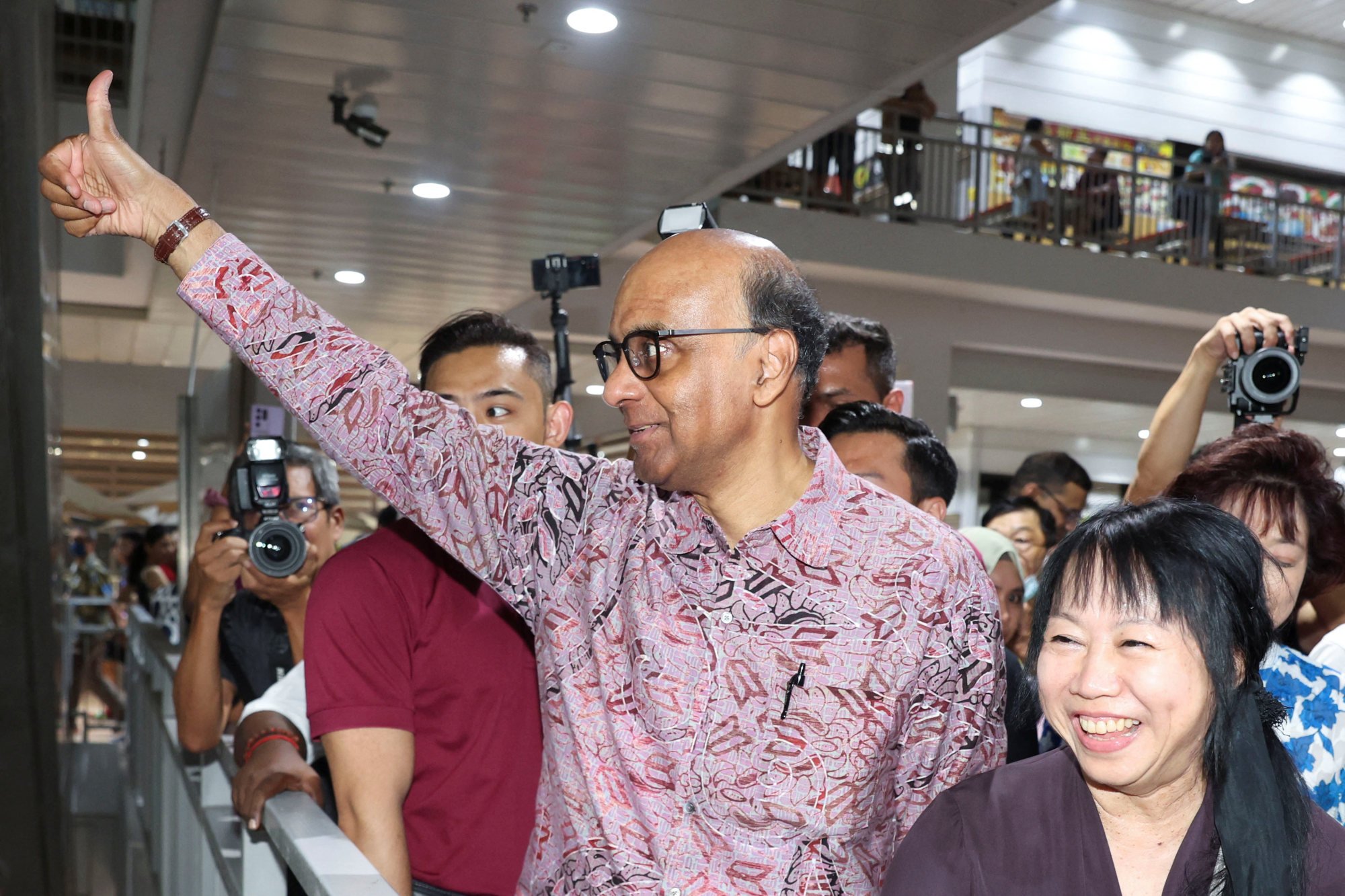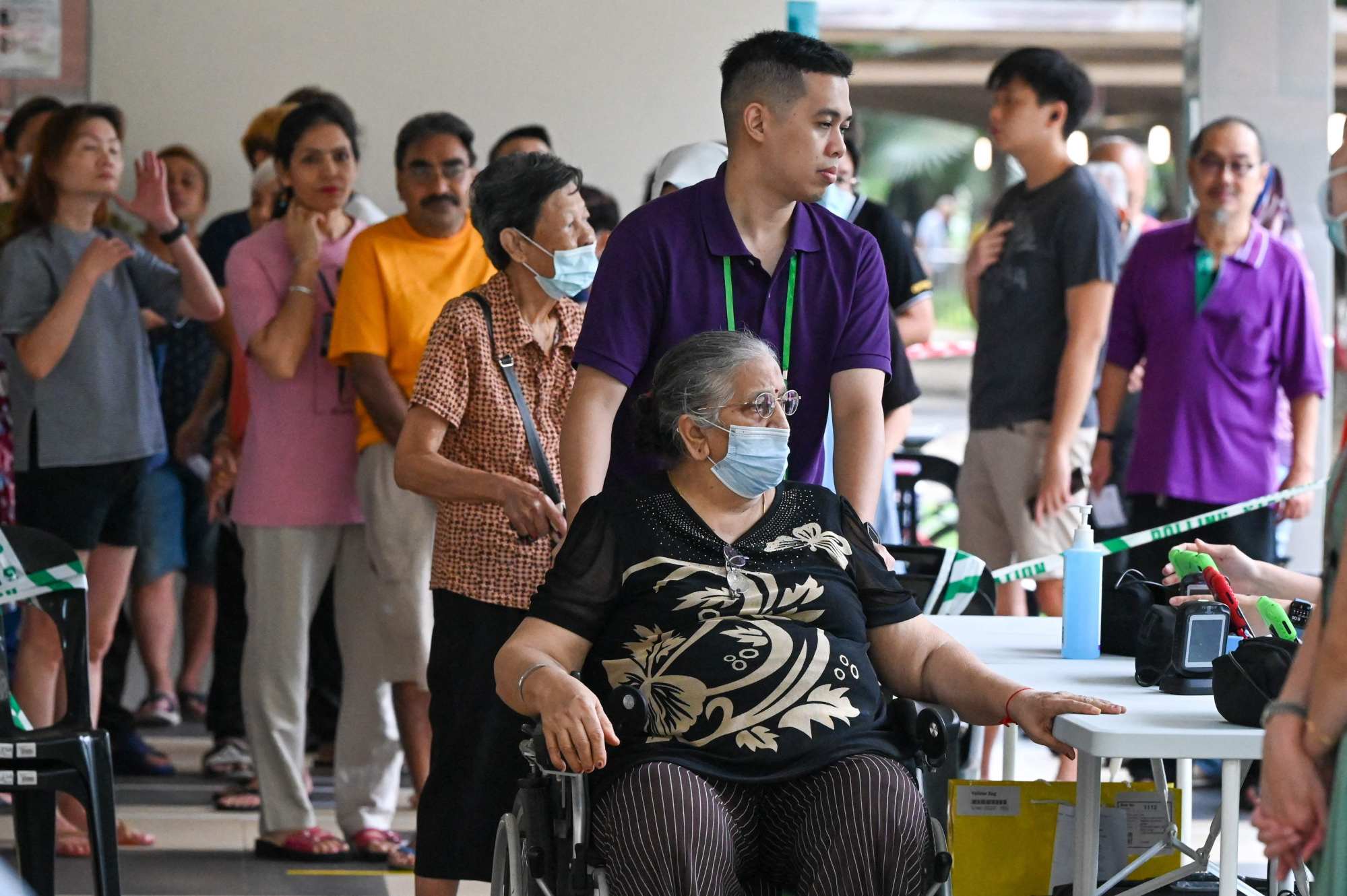
Singapore’s Tharman Shanmugaratnam elected president after landslide victory: ‘vote of optimism’
- Former minister Tharman is elected the city state’s ninth president after winning 70.4 per cent of the vote in a three-way race on Friday
- The result foiled expectations he would be hurt by public dissatisfaction with the ruling PAP over its recent spate of internal scandals
Ng won 15.72 per cent of valid votes while Tan received 13.88 per cent of the votes. More than 2.48 million votes were cast in Singapore, with 50,152 rejected votes.
Tharman said he was humbled by the result. “It’s a vote of optimism for a future in which we can progress together and support each other as Singaporeans,” he said.
Singaporeans reflect on values, ‘antics’, vows as presidential campaigning ends
Prime Minister Lee Hsien Loong, the leader of the PAP government, said in a statement that he had called Tharman and assured him of the administration’s full cooperation.
“I have every confidence that he will carry out his duties as President with distinction,” Lee said. “Mr Tharman has also declared his intention to work closely with the government,” he added.
The republic’s presidency is a largely ceremonial role with custodial powers over the use of the country’s vast fiscal reserves and appointment of key public officials such as the chief justice, military chief, police commissioner and the attorney general.
Ng, 75, is a former chief investment officer at the state investor GIC, and was seen as the next most palatable to the republic’s middle-ground voters.

Ng concedes
Even though the Elections Department has not formally declared Tharman has been elected Singapore’s ninth president, victory is secure. That was further confirmed after Ng, who is second in the race with 16 per cent of votes based on the sample count, said he was conceding to Tharman.
“To the people of Singapore, I wish to say the relatively low percentage of votes that I obtained was the price that I willingly paid in order to give Singaporeans the opportunity to exercise their right to vote,” said Ng, a bureaucrat who later joined the powerful state investor GIC and steered it through multiple economic crises.
“I wish Mr Tharman every success in the presidency, and I’m confident that you will make a very good president,” Ng said.

‘A vote for Singapore’
Speaking to the media after the Election Department’s release of the sample count, Tharman said he was “truly humbled” by the strong support Singaporeans had shown for him, based on the sample count. He said a vote for him was “a vote for Singapore”.
“It’s a vote of optimism for a future in which we can progress together and support each other as Singaporeans,” Tharman said, speaking from a hawker centre in his former constituency of Jurong.
“That has been my platform, and I believe it has received strong endorsement by Singaporeans. So it’s not just about me … this is about Singapore and confidence in Singapore.”
The veteran politician, a Ceylon Tamil, said his expected victory was indicative of the progress Singapore was continuing to make as a multiracial nation. People of Chinese ethnicity make up 76 per cent of Singapore’s resident population, followed by 15 per cent who are Malays and about 8 per cent who are of South Asian descent.
“With each half-decade, Singapore is changing. And I hope that my being elected president is seen as another milestone in that process of evolution,” Tharman said.
Singapore presidential rivals slam Tan Kin Lian for opposition endorsements
Tharman well ahead
Tharman is headed towards a decisive victory in the republic’s three-way presidential poll, a sample of votes showed.
The former ruling party stalwart may have won well over 70 per cent of votes cast, the Election Department sample count showed.
The random sample of 100 votes was taken from each of the republic’s 1,264 polling stations. The department has said the final result might differ from what is indicated in the sample count.
Victory for Tharman, if confirmed, would burnish analysts’ earlier suggestions that his high standing among citizens is distinct from that of the ruling PAP that he was a part of for 22 years.
There had been expectations that while Tharman was the front runner in the polls, his victory margin would be reduced, given dissatisfaction with the ruling party over its recent spate of internal scandals.
“I would attribute this [his victory] to his being a well-regarded public figure with a track record unmatched by his fellow candidates,” political observer Eugene Tan said.
“He fought a dignified campaign focusing on his own qualities and track record, and his slogan of ‘Respect for All’ resonated,” the professor at Singapore Management University said.

In home ground
Tharman has turned up in the western heartland district of Jurong, where he was MP for 22 years. Hundreds of supporters have shown up at the Taman Jurong hawker centre where he is, chanting “Ong Lai!” (pineapple in Hokkien) and “Huat Ah!”.
The former minister served as MP for 22 years in the group representation constituency, and consistently won elections there with a large margin.
In the 2015 general election, for instance, his PAP team won 79 per cent of votes cast – a rare margin even in a country where a single party has governed for some six decades.
The republic is eagerly waiting for the release of a sample count that will indicate how the three candidates fared.

Hong Kong’s Signal 10 warning doesn’t deter voters
Some 6,649 overseas Singaporean voters were registered to cast their ballots. Of these, 3,217 voters voted in person in polling stations in Beijing, Canberra, Dubai, Hong Kong, London, New York, San Francisco, Shanghai, Tokyo and Washington. The remaining 3,432 registered overseas voters are casting their ballot by post, national broadcaster CNA said.
In total, these citizens make up some 0.25 per cent of the electorate, meaning their votes will only make a difference in the election outcome if the margin between the top two candidates is razor-thin.
Despite the hoisting of the Signal 9 and 10 storm warning in Hong Kong – home to one of the republic’s biggest overseas diasporas – voting went ahead as planned.

Vote counting begins
The Elections Department said vote counting would begin after the end of the polling period. As was the case in the 2020 legislative election, mechanical counting machines – similar to those used to count and handle banknotes – will be used to raise the efficiency of the counting process.
The department said more than 2.3 million people, or 85 per cent of eligible voters, had cast their votes by 5pm.
The department is expected to release a sample count between 10pm and 11pm, that could offer an early indication of the election outcome.
A sample of 100 votes is taken from each of the 1,264 polling stations for the early count, and the department has cautioned that the final result could be different.


